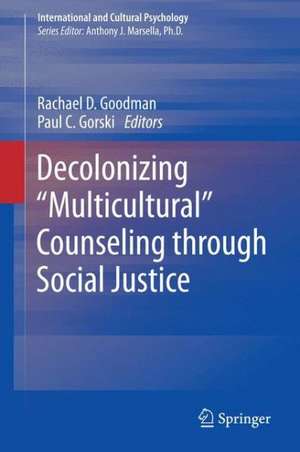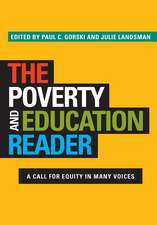Decolonizing “Multicultural” Counseling through Social Justice: International and Cultural Psychology
Editat de Rachael D. Goodman, Paul C. Gorskien Limba Engleză Hardback – 4 noi 2014
In Decolonizing "Multicultural" Counseling through Social Justice, counseling and psychology scholars and practitioners examine this paradox through a social justice lens by questioning and challenging the infrastructure of dominance in society, as well as by challenging ourselves as practitioners, scholars, and activists to rethink our commitments. The authors analyze the ways well-meaning clinicians might marginalize clients and contribute to structural inequities despite multicultural or cross-cultural training, and offer new frameworks and skills to replace the essentializing and stereotyping practices that are widespread in the field. By addressing the power imbalances embedded in key areas of multicultural theory and practice, contributors present innovative methods for revising research paradigms, professional education, and hands-on practice to reflect a commitment to equity and social justice. Together, the chapters in this book model transformative practice in the clinic, the schools, the community, and the discipline. Among the topics covered:
- Rethinking racial identity development models.
- Queering multicultural competence in counseling.
- Developing a liberatory approach to trauma counseling.
- Decolonizing psychological practice in the context of poverty.
- Utilizing indigenous paradigms in counseling research.
- Addressing racism through intersectionality.
| Toate formatele și edițiile | Preț | Express |
|---|---|---|
| Paperback (1) | 635.15 lei 6-8 săpt. | |
| Springer – 13 ian 2016 | 635.15 lei 6-8 săpt. | |
| Hardback (1) | 999.94 lei 6-8 săpt. | |
| Springer – 4 noi 2014 | 999.94 lei 6-8 săpt. |
Din seria International and Cultural Psychology
- 18%
 Preț: 1117.03 lei
Preț: 1117.03 lei - 17%
 Preț: 490.68 lei
Preț: 490.68 lei - 15%
 Preț: 587.02 lei
Preț: 587.02 lei - 15%
 Preț: 647.40 lei
Preț: 647.40 lei - 5%
 Preț: 718.10 lei
Preț: 718.10 lei - 24%
 Preț: 797.39 lei
Preț: 797.39 lei - 20%
 Preț: 564.52 lei
Preț: 564.52 lei - 18%
 Preț: 1693.62 lei
Preț: 1693.62 lei - 18%
 Preț: 1010.48 lei
Preț: 1010.48 lei - 18%
 Preț: 784.13 lei
Preț: 784.13 lei - 18%
 Preț: 780.52 lei
Preț: 780.52 lei - 18%
 Preț: 946.24 lei
Preț: 946.24 lei - 15%
 Preț: 641.85 lei
Preț: 641.85 lei - 18%
 Preț: 952.57 lei
Preț: 952.57 lei - 5%
 Preț: 1031.68 lei
Preț: 1031.68 lei - 15%
 Preț: 637.13 lei
Preț: 637.13 lei - 5%
 Preț: 708.78 lei
Preț: 708.78 lei - 15%
 Preț: 476.75 lei
Preț: 476.75 lei - 18%
 Preț: 1120.18 lei
Preț: 1120.18 lei - 15%
 Preț: 638.76 lei
Preț: 638.76 lei - 20%
 Preț: 556.10 lei
Preț: 556.10 lei - 15%
 Preț: 700.10 lei
Preț: 700.10 lei - 15%
 Preț: 697.94 lei
Preț: 697.94 lei - 5%
 Preț: 1095.90 lei
Preț: 1095.90 lei - 24%
 Preț: 842.28 lei
Preț: 842.28 lei - 15%
 Preț: 646.62 lei
Preț: 646.62 lei - 18%
 Preț: 947.95 lei
Preț: 947.95 lei - 18%
 Preț: 892.74 lei
Preț: 892.74 lei - 5%
 Preț: 1098.27 lei
Preț: 1098.27 lei - 20%
 Preț: 552.45 lei
Preț: 552.45 lei - 15%
 Preț: 649.54 lei
Preț: 649.54 lei - 18%
 Preț: 785.55 lei
Preț: 785.55 lei - 18%
 Preț: 947.67 lei
Preț: 947.67 lei - 18%
 Preț: 947.98 lei
Preț: 947.98 lei - 18%
 Preț: 952.26 lei
Preț: 952.26 lei
Preț: 999.94 lei
Preț vechi: 1219.43 lei
-18% Nou
Puncte Express: 1500
Preț estimativ în valută:
191.33€ • 199.79$ • 157.100£
191.33€ • 199.79$ • 157.100£
Carte tipărită la comandă
Livrare economică 15-29 aprilie
Preluare comenzi: 021 569.72.76
Specificații
ISBN-13: 9781493912827
ISBN-10: 1493912828
Pagini: 311
Ilustrații: XIV, 174 p. 2 illus.
Dimensiuni: 155 x 235 x 17 mm
Greutate: 0.45 kg
Ediția:2015
Editura: Springer
Colecția Springer
Seria International and Cultural Psychology
Locul publicării:New York, NY, United States
ISBN-10: 1493912828
Pagini: 311
Ilustrații: XIV, 174 p. 2 illus.
Dimensiuni: 155 x 235 x 17 mm
Greutate: 0.45 kg
Ediția:2015
Editura: Springer
Colecția Springer
Seria International and Cultural Psychology
Locul publicării:New York, NY, United States
Public țintă
Professional/practitionerCuprins
Introduction: Toward a Decolonized Multicultural Counseling and Psychology.- The Application of Critical Consciousness and Intersectionality as Tools for Decolonizing Racial/Ethnic Identity Development Models in the Fields of Counseling and Psychology.- Queering Multicultural Competence in Counseling.- Colonialism and Multicultural Counseling Competence Research: A Liberatory Analysis.- A Liberatory Approach to Trauma Counseling: Decolonizing Our Trauma-Informed Practices.- Decolonizing Psychological Practice in the Context of Poverty.- Story Sciencing and Analyzing the Silent Narrative Between Words: Counseling Research from an Indigenous Perspective.- Decolonizing Alterity Models Within School Counseling Practice.- Decolonizing Multicultural Counseling and Psychology: Addressing Race Through Intersectionality.- (De)colonizing Culture in Community Psychology: Reflections from Critical Social Science.- Decolonizing Traditional Pedagogies and Practices in Counseling and Psychology Education: A Move Towards Social Justice and Action.
Notă biografică
Dr. Rachael D. Goodman is an Assistant Professor in the Counseling and Development Program at George Mason University. Dr. Goodman's interests focus on social justice issues in counseling, with an emphasis on trauma counseling, including historical/transgenerational trauma, systemic oppression/marginalization, immigrants and refugees, and disaster response/community outreach. Her research and clinical work has included outreach and trauma counseling among marginalized populations, particularly in communities that have experienced oppression or natural/human-made disaster. Currently, Dr. Goodman is conducting research using a community-based participatory research (CBPR) model, focused on the experiences of immigrant and refugee children and families, including transgenerational trauma and resilience.
Paul C. Gorski is an Associate Professor of Integrative Studies at George Mason University, where he teachers courses on social justice, human rights, and animal rights. He isa Research Fellow in the Center for the Advance of Well-Being and on the board of directors of the International Association for Intercultural Education. His recent books include Reaching and Teaching Students in Poverty: Strategies for Erasing the Opportunity Gap, The Big Lies of School Reform (with Kristien Zenkov), The Poverty and Education Reader (with Julie Landsman), and Case Studies on Diversity and Social Justice Education (with Seema Pothini). He lives in Falls Church, Virginia, with his cats Unity and Buster.
Paul C. Gorski is an Associate Professor of Integrative Studies at George Mason University, where he teachers courses on social justice, human rights, and animal rights. He isa Research Fellow in the Center for the Advance of Well-Being and on the board of directors of the International Association for Intercultural Education. His recent books include Reaching and Teaching Students in Poverty: Strategies for Erasing the Opportunity Gap, The Big Lies of School Reform (with Kristien Zenkov), The Poverty and Education Reader (with Julie Landsman), and Case Studies on Diversity and Social Justice Education (with Seema Pothini). He lives in Falls Church, Virginia, with his cats Unity and Buster.
Textul de pe ultima copertă
Multicultural counseling and psychology evolved as a response to the Eurocentrism prevalent in the Western healing professions and has been used to challenge the Eurocentric, patriarchal, and heteronormative constructs commonly embedded in counseling and psychology. Ironically, some of the practices and paradigms commonly associated with “multiculturalism” reinforce the very hegemonic practices and paradigms that multicultural counseling and psychology approaches were created to correct.
In Decolonizing "Multicultural" Counseling through Social Justice, counseling and psychology scholars and practitioners examine this paradox through a social justice lens by questioning and challenging the infrastructure of dominance in society, as well as by challenging ourselves as practitioners, scholars, and activists to rethink our commitments. The authors analyze the ways well-meaning clinicians might marginalize clients and contribute to structural inequities despite multicultural or cross-cultural training, and offer new frameworks and skills to replace the essentializing and stereotyping practices that are widespread in the field. By addressing the power imbalances embedded in key areas of multicultural theory and practice, contributors present innovative methods for revising research paradigms, professional education, and hands-on practice to reflect a commitment to equity and social justice. Together, the chapters in this book model transformative practice in the clinic, the schools, the community, and the discipline. Among the topics covered:
In Decolonizing "Multicultural" Counseling through Social Justice, counseling and psychology scholars and practitioners examine this paradox through a social justice lens by questioning and challenging the infrastructure of dominance in society, as well as by challenging ourselves as practitioners, scholars, and activists to rethink our commitments. The authors analyze the ways well-meaning clinicians might marginalize clients and contribute to structural inequities despite multicultural or cross-cultural training, and offer new frameworks and skills to replace the essentializing and stereotyping practices that are widespread in the field. By addressing the power imbalances embedded in key areas of multicultural theory and practice, contributors present innovative methods for revising research paradigms, professional education, and hands-on practice to reflect a commitment to equity and social justice. Together, the chapters in this book model transformative practice in the clinic, the schools, the community, and the discipline. Among the topics covered:
- Rethinking racial identity development models.
- Queering multicultural competence in counseling.
- Developing a liberatory approach to trauma counseling.
- Decolonizing psychological practice in the context of poverty.
- Utilizing indigenous paradigms in counseling research.
- Addressing racism through intersectionality.
Caracteristici
Provides social justice framework for clinical practice Analyzes comparative practices and programs Each chapter built around a specific case example Includes supplementary material: sn.pub/extras


















